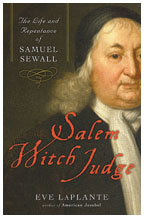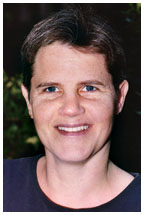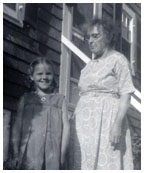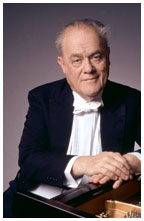December 12, 2007: Books and Arts
Mining family history
Eve LaPlante ’80 pens study of a Salem witch judg1
Pianist-scholar going strong
Charles Rosen ’48 *51 performs in Europe
For a complete list of books received, click here.
Eve LaPlante ’80 is a direct descendant of Salem witch judge Samuel Sewall.
(courtesy Eve Laplante ’80) |
Reading
Room
Mining family history
Eve LaPlante ’80 pens study of a Salem witch judge
By Iris Blasi ’03
On childhood visits to her great-aunt Charlotte’s Cape Cod house, Eve LaPlante ’80 was regaled by her aunt, the family historian, with stories about their illustrious ancestors. With roots stretching deep into American history, their lineage boasted such figures as Louisa May Alcott and Col. Joseph May, the 19th-century founder of Massachusetts General Hospital. Also among the branches of the family tree were Anne Hutchinson, banished from Puritan Massachusetts Bay Colony in 1683 for her progressive theological interpretations, and Samuel Sewall, LaPlante’s direct ancestor and the only one of the Salem witch-trial judges to publicly recant his involvement.
While proud of the first two, LaPlante recalls that when she was a child the idea of being related to people like Anne Hutchinson and Samuel Sewall seemed shameful and embarrassing. “I particularly didn’t understand why Aunt Charlotte was so excited about a witch judge,” she says.
It wasn’t until years later when, as a freelance writer seeking potential subjects, she looked more closely at her family’s history that she began to understand just why it had fascinated her aunt. The result: American Jezebel: The Uncommon Life of Anne Hutchinson, the Woman Who Defied the Puritans, published in 2004 to critical acclaim.
 LaPlante,
an English major at Princeton, then turned to her other notorious relative,
about whom she has written her latest book, Salem Witch Judge: The
Life and Repentance of Samuel Sewall, published by HarperOne in October.
LaPlante,
an English major at Princeton, then turned to her other notorious relative,
about whom she has written her latest book, Salem Witch Judge: The
Life and Repentance of Samuel Sewall, published by HarperOne in October.
For LaPlante, it’s not what Sewall did during the Salem witch trials, but what he did after they concluded, that makes him remarkable. In 1692, Sewall was part of the court that convicted more than 100 people of witchcraft and sent 20 of them to the gallows. Then, in 1697, Sewall stood up in a packed New England meetinghouse and publicly repented.
“He realized he was wrong, and he just couldn’t live with that. He had to fix it,” LaPlante says. Bad weather, a food shortage, and the deaths of several of his children convinced Sewall, as LaPlante writes, “of God’s anger,” and after years of prayer and Scripture study, he saw his participation in the witch trials as a violation of “the laws of humanity and the laws of God.”
Not content with repentance, in the latter portion of his life, Sewall actively atoned for his sins. He penned America’s first abolitionist argument and became a proponent of the rights of Native Americans and of the equality of women — all deeds most likely related to his desire to make amends. “I think that, if the witch trials had not occurred, [his thoughts] wouldn’t have crystallized into these important works,” LaPlante says.
Using Sewall’s diary and primary sources, LaPlante, who lives in Massachusetts on land originally owned by Sewall, reconstructs an era as well as the workings of one man’s mind.
Though initially embarrassed by her infamous relative, LaPlante now
sees how remarkable his strength of character really was, writing, “How
American it is to claim, ‘I can judge right from wrong,’ and
then to admit, ‘I was wrong.’” ![]()
Iris Blasi ’03 is a writer and editor in New York City.
For a complete list of books received, click here.
 Health
Care Half Truths: Too Many Myths, Not Enough Reality —
Arthur Garson ’70 and Carolyn L. Engelhard (Rowman and Littlefield).
The authors identify 20 commonly held misperceptions about the American
health-care system and suggest ways to improve quality and coverage and
control costs. Garson, a pediatric cardiologist, is provost of the Univer-sity
of Virginia. Engelhard is a health-policy analyst at the University of
Virginia’s School of Medicine.
Health
Care Half Truths: Too Many Myths, Not Enough Reality —
Arthur Garson ’70 and Carolyn L. Engelhard (Rowman and Littlefield).
The authors identify 20 commonly held misperceptions about the American
health-care system and suggest ways to improve quality and coverage and
control costs. Garson, a pediatric cardiologist, is provost of the Univer-sity
of Virginia. Engelhard is a health-policy analyst at the University of
Virginia’s School of Medicine.
 The Most
Noble Adventure: The Marshall Plan and the Time When America Helped Save
Europe — Greg Behrman ’98 (Free Press). The author
chronicles the plan, outlined by Secretary of State George C. Marshall
in June 1947 and considered by leading scholars as the greatest act of
American foreign policy in history, from its infancy to its completion
in Europe. Behrman explains how the program to revive Europe’s economies
achieved its aims and profiles key leading figures. Behrman is a Carr
Center fellow at the John F. Kennedy School of Government at Harvard University.
The Most
Noble Adventure: The Marshall Plan and the Time When America Helped Save
Europe — Greg Behrman ’98 (Free Press). The author
chronicles the plan, outlined by Secretary of State George C. Marshall
in June 1947 and considered by leading scholars as the greatest act of
American foreign policy in history, from its infancy to its completion
in Europe. Behrman explains how the program to revive Europe’s economies
achieved its aims and profiles key leading figures. Behrman is a Carr
Center fellow at the John F. Kennedy School of Government at Harvard University.
 Hotel
de Dream: A New York Novel — Edmund White (Ecco). The author
imagines the last days of author Stephen Crane as he lies on his deathbed
in the English countryside and dictates his last novel, The Painted
Boy, to his wife, Cora, who had run a Florida brothel called the
Hotel de Dream. The novel-within-the-novel re-creates the lives of a boy
prostitute, Elliott, and the married middle-aged banker who falls in love
with him in late 19th-century New York. White is a professor of creative
writing at Princeton.
Hotel
de Dream: A New York Novel — Edmund White (Ecco). The author
imagines the last days of author Stephen Crane as he lies on his deathbed
in the English countryside and dictates his last novel, The Painted
Boy, to his wife, Cora, who had run a Florida brothel called the
Hotel de Dream. The novel-within-the-novel re-creates the lives of a boy
prostitute, Elliott, and the married middle-aged banker who falls in love
with him in late 19th-century New York. White is a professor of creative
writing at Princeton. ![]()
By K.F.G.
In January, Charles Rosen ’48 *51 will play in concerts in Turin, Italy, honoring Elliott Carter. (Courtesy Charles Rosen ’48 *51) |
Pianist-scholar
going strong
Charles Rosen ’48 *51 performs in Europe
By Van Wallach ’80
At 80, pianist and polymath Charles Rosen ’48 *51 is still going strong as an interpreter of classical and modern music. In January, for example, he will perform in concerts in Turin, devoted to the music of composer Elliott Carter, whom Rosen has known a half-century.
Rosen, who enrolled at the Juilliard School at 6 and made his first recording in 1951, met Carter in the mid-1950s. He describes Carter, who turns 100 next year, as “the greatest representative of the modernist style” of music in the United States.
In Turin Rosen will play the solo piece “90+” and “Dialogues for Piano and Orchestra” with the Turin Radio Orchestra, and a duet with cellist Fred Sherry. Before Turin, Rosen will tour Europe with performances of Chopin, Beethoven, and Mozart. Come spring, he’ll be in Athens and Helsinki.
Rosen has distilled his vision into 50 recordings of composers from Bach to Ravel to Bartók, winning two Grammy nominations along the way. One of the most widely respected pianists of our time, and an authority on Beethoven, Rosen gave a well-reviewed lecture and recital on his 80th birthday last May in New York.
A musicologist, Rosen has left his mark on musical criticism as well. His 1971 landmark book, The Classical Style: Haydn, Mozart, and Beethoven won the 1972 National Book Award. A true Renaissance man, he has written books and articles on art and intellectual history and taught and lectured at MIT, Oxford, the University of Chicago, and Harvard.
Rosen practices as much as four hours a day on the Steinway piano in his book-lined apartment on Manhattan’s Upper West Side. When he tackles a new work, “I just practice a piece until it gets into my fingers,” he says. “When you’re my age, you don’t learn it so fast.”
Items showing Rosen’s love of knowledge and culture fill every nook and cranny of his apartment, from a 16th-century French translation of Plutarch to a Russian samovar (a metal urn to heat water for tea) that bespeaks his Russian-Jewish roots. He moves easily from recalling musicians he has known — Igor Stravinsky and Milton Babbitt *92 — to his ideas for a New York Review of Books article on a new edition of the works of French philosopher Michel de Montaigne, to an impromptu performance (from Mozart’s “Jupiter Symphony”).
If he weren’t a musician, what would Rosen be doing? He ponders
the question, then replies, “I’ve wanted to be a pianist since
I was 4. If I didn’t play the piano, I wouldn’t be me.”
![]()
Van Wallach ’80 is a freelance writer in Stamford, Conn.



